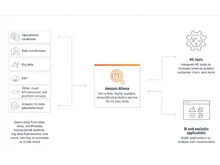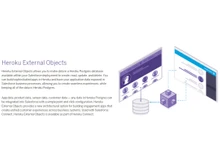When it comes to hosting applications, Heroku and AWS are two popular choices. Heroku is a fully managed platform as a service (PaaS) that allows developers to focus on writing code without worrying about infrastructure management. AWS, on the other hand, is a comprehensive cloud computing platform that offers a wide range of services, including computing, storage, database, analytics, application services, and security. Heroku is known for its ease of use, scalability, and rapid deployment, while AWS offers more flexibility and customization options.
Here, we will be comparing both Heroku and AWS to understand which one is better in terms of different parameters. These include features, key differences, pricing, performance, complexity, deployment, platform model, scalability, and more.
AWS vs Heroku: An Overview
Heroku is a popular cloud computing platform that allows developers to deploy and manage applications without worrying about infrastructure. It provides a scalable and reliable environment for deploying web applications, as well as tools for version control, testing, and collaboration. With Heroku, developers can quickly and easily deploy and scale their applications, making it a great choice for startups and businesses of all sizes.
On the other hand, AWS stands for Amazon Web Services, a cloud computing platform offered by Amazon. It provides a wide range of services, including computing, storage, networking, database management, analytics, machine learning, and security. AWS offers flexible pricing models, including pay-as-you-go and subscription-based options, making it a popular choice for businesses of all sizes.
AWS vs Heroku: Key Differences
- Heroku supports fewer geographical regions compared to AWS, providing a more limited geographic reach.
- AWS and other similar AWS alternatives offer a breadth of services but can require manual configurations. Heroku has a user-friendly interface and framework.
- AWS offers a powerful yet complex infrastructure. Heroku, on the other hand, is ideal for organizations looking for simplicity and flexibility.
AWS and Heroku: In Terms of Features
- Storage and Database: Heroku offers limited options for data storage but allows add-ons for additional databases. In contrast, AWS provides more flexibility and multiple specialized services for data storage.
- Platform Model: Heroku is a PaaS platform with limited language, database, and environment options. AWS provides more flexibility as an IaaS platform but requires higher technical skills for setup and administration.
- Scaling Model: Heroku provides an easy-to-use horizontal scaling model where you can increase the number of dynos (containers) to handle increased traffic. AWS, as a cloud infrastructure provider, allows you to scale both vertically (resizing instances) and horizontally (load balancing and auto-scaling).
- Service Variety: AWS offers a wide range of services, including infrastructure services (EC2, S3, RDS), serverless computing (Lambda), container management (ECS, EKS), and more. Heroku, although built on top of AWS, mainly focuses on application deployment and management. Heroku provides a curated selection of services and add-ons that simplify the deployment process.
AWS and Heroku: Suitability and Computational Demands
Heroku and other Heroku alternatives are suitable for startups and medium businesses, while AWS is focused on medium businesses and large enterprises. Heroku can meet low computational demands, while AWS can meet high/very high computational demands.
Heroku and AWS: Popularity
Heroku is more selective in its target market and has a smaller user base compared to AWS. On the other hand, Amazon Web Services (AWS) is the most popular cloud computing service, serving millions of websites worldwide. Therefore, AWS has a broader range of computing organizations and businesses using its services.
AWS or Heroku: Ease of Use
Heroku has an easy-to-use platform with preconfigured amenities and seamless deployments. On the other hand, AWS is more complex and flexible, requiring more management of infrastructure.
AWS vs Heroku: Pricing
Heroku uses a platform-as-a-service (PaaS) model, where you pay based on the resources you use. The pricing is straightforward and includes the cost of hosting, add-ons, and other services. AWS, on the other hand, offers a pay-as-you-go model, where pricing can be more complex and depends on factors such as the type and size of instances, data transfer, storage, and other services.
AWS and Heroku: Complexity
Heroku is designed to be simple and user-friendly, with a focus on ease of use and quick deployment. AWS, on the other hand, is a comprehensive and complex cloud computing platform with a vast array of services and configurations. AWS provides more flexibility but also has a steeper learning curve.
Heroku and AWS: Customization and Control
AWS provides extensive customization and control options, allowing you to configure your infrastructure and services as per your specific requirements. Heroku, on the other hand, cuts off the underlying infrastructure details and provides a clearer approach with less flexibility and control over infrastructure configurations.
AWS or Heroku: Deployment and Management
Heroku provides a streamlined deployment process with its command-line interface (CLI) and Git integration. It handles various tasks such as provisioning servers, load balancing, and security configurations. AWS, being a more comprehensive platform, requires more manual setup and configuration, but provides greater control over the deployment process.
AWS vs Heroku: Community and Support
Both Heroku and AWS have active communities, but AWS has a larger user base and extensive documentation due to its wide range of services. AWS also has a broader support ecosystem, including official support from Amazon and third-party resources. Heroku has a smaller and more focused community centered around its platform-specific features.
Verdict: AWS vs Heroku
Overall, Heroku is a user-friendly PaaS platform ideal for startups, offering simplicity and scalability with limited geographical reach. AWS, on the other hand, is a comprehensive cloud computing platform suitable for medium businesses and large enterprises, providing flexibility, customization, and a wide range of services. AWS has a larger user base and more extensive documentation, while Heroku focuses on application deployment and management. AWS offers more options for data storage and a variety of services, while Heroku provides a streamlined deployment process. Heroku uses a straightforward pricing model, while AWS pricing is more complex.


 5 Ratings & 3 Reviews
5 Ratings & 3 Reviews























